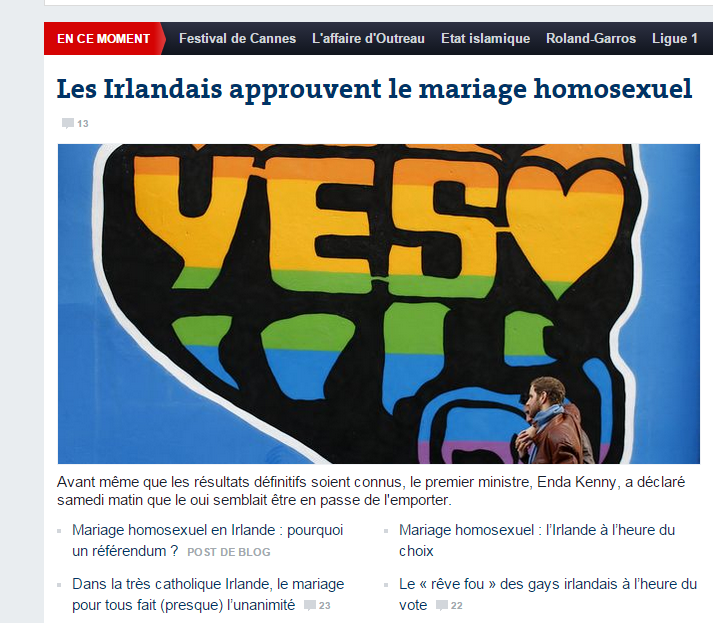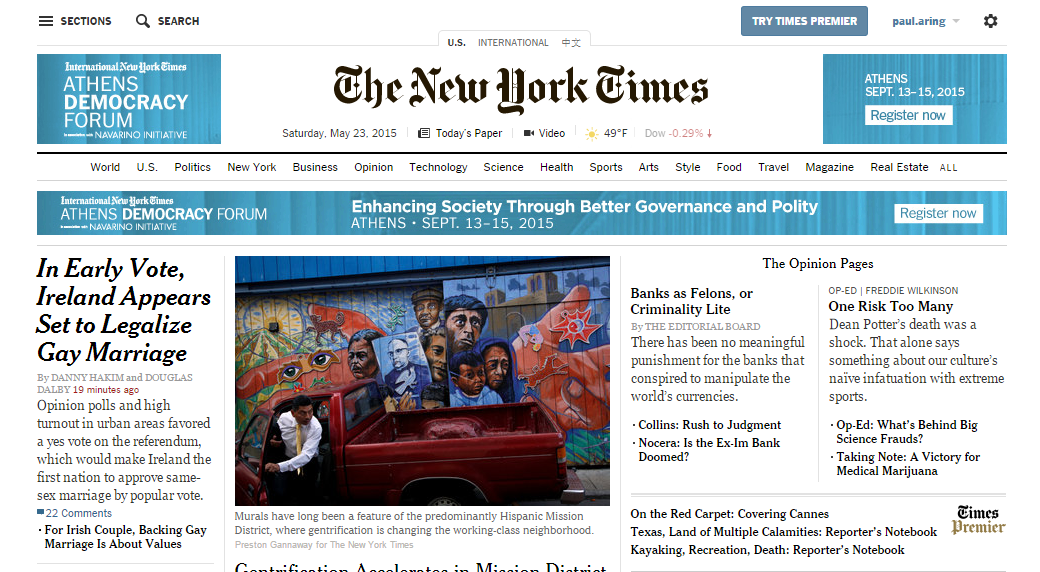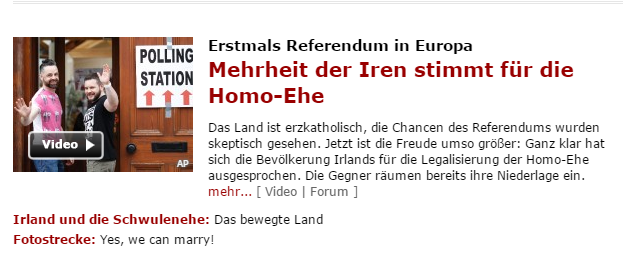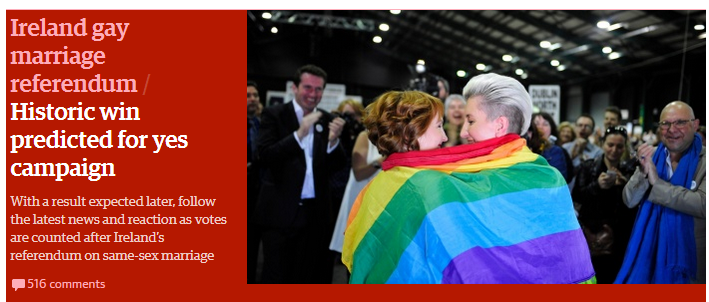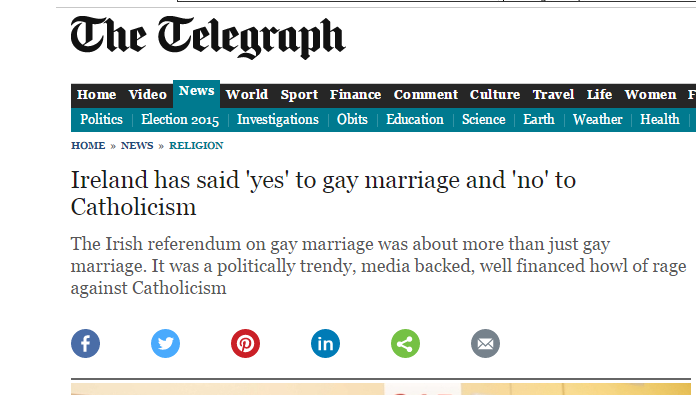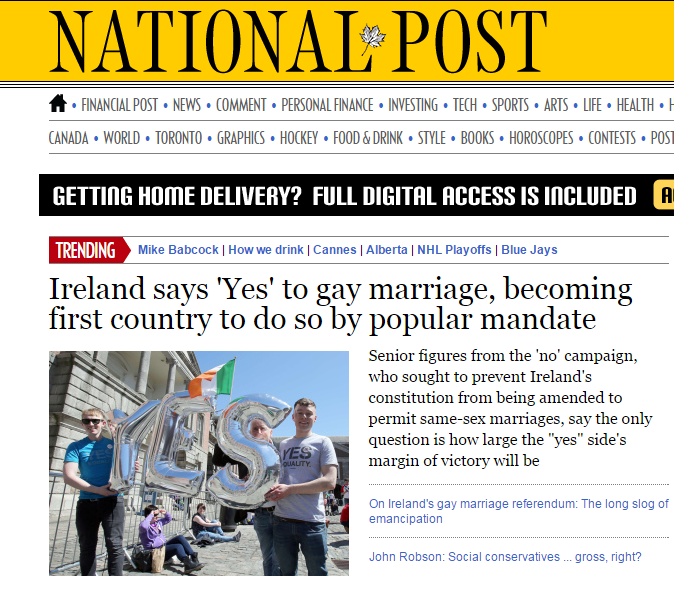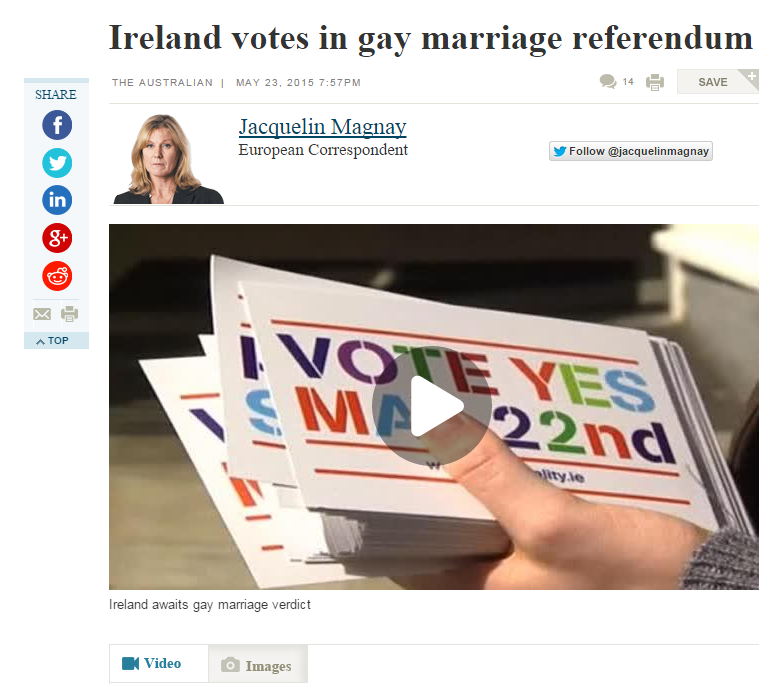History was made today as Ireland became the first country in the world to approve same-sex marriage through a referendum. Predictably, this made headlines across the globe as rare beacon of a democracy done good. The entire world were talking about us on this little island:
Le Monde in France hailed "paradigm shift":
Whatever happens, it is a major paradigm shift. Long considered a bastion of religious and social conservatism in Europe , Ireland , 84 % of people say they are Catholic obedience and almost 50 % go to Mass every Sunday , could become the first country in the world to by referendum endorsing gay marriage.
The New York Times featured the referendum prominently on its front page:
Ireland appeared poised to become the world’s first nation to approve same-sex marriage by a popular vote on Saturday, with early vote counts showing strong and broad support for a measure that would have been unthinkable just a few years ago in what had traditionally been a Roman Catholic stronghold.
While the paper of record comments section was almost unanimous in its approval:
Justices Roberts, Alito, Kennedy, Scalia, Thomas and Sotomayer, are you watching and listening?
Beyond the central issue of equality, Ireland has engaged a generation of young voters and put a modern face on a traditional country. Every Irish political party supported it, setting an example for the rest of the world. Regardless of the final tally, Ireland should be proud.
Ireland goes down in history. Wish I had more ancestral Irish in me. The term "Proud to be Irish" is certainly earned this day..
Der Spiegel in Germany pointed to the amazing shift over the last number of years:
Still in the nineties homosexuality was a crime in Ireland and was punishable by imprisonment . Now the Irish vote on whether homosexuals may marry regularly - a cultural break in an arch-conservative Catholic country .
La Repubblica in Italy said the vote was an "appointment with history"
Not to miss their appointment with history: why, if 21 countries around the world have already legalized gay marriage (Denmark, Netherlands, Belgium, Spain, France, Canada, South Africa, Norway, Sweden, Slovenia, Portugal, England , Wales, Iceland, Argentina, Uruguay, New Zealand, Finland, Mexico, Brazil and the US, in 38 states), Ireland will be the first to do so through a referendum. Five years after the approval in Parliament of civil unions for same-sex couples. Unimaginable just 20 years ago, when the Republic of '' green island "was finally erased the criminal offense of" homosexuality. "
The Guardian had the referendum front and center online throughout the day, and featured a lovely quote from Peter Tatchell:
“The Irish people have voted for love and equality. Oscar Wilde would be so proud. This vote will give hope to millions of same-sex couples around the world who want to marry the person they love. Equal marriage is an unstoppable global trend. The Irish vote is proof that love can triumph over prejudice and discrimination.”
The Telegraph meanwhile featured a somewhat different take in the form of a column from Tim Stanley who saw the vote as a rejection of the church:
Shake off the last remnants of traditional religious authority, it was reasoned, and Ireland could finally join the 21st century. Au revoir, Father Ted.
To emphasise, the Yes vote was undoubtedly a reflection of growing tolerance towards gays and lesbians. But it was also a politically trendy, media backed, well financed howl of rage against Catholicism. How the Church survives this turn, is not clear. It'll require a lot of hard work and prayers.
The National Post in Canada featured a rousing and rational column from Terry Glavin:
Tá, comhionannas — Yes, equality — would stand not only as an overdue triumph in the cause of the emancipation of the Catholic Irish. It would stand as well as another small assurance, a tiny bit of hope, that the unjustly treated, everywhere, will one day win.
The Australian meanwhile speculated that the historic Irish vote lends weight to a similar campaign in Australia:
A big victory — if the early results are replicated as the votes continue to be counted in the early hours Australian time — will help reposition Ireland as a progressive and inclusive society and shred its reputation of being closely tied to the Catholic Church, which had opposed the gay marriage move.
Irish expatriate Mark Govern told The Australian that a Yes vote would encourage Australia, his adopted country, to follow suit. He was surprised that the Australian government had been behind on the issue, particularly as Sydney was regarded as a gay capital.


